Managed Storage provides massive storage capacity for data applications and middleware such as a database. It offers a scalable response to the need for accessing reliable data with high security against data breaches and digital manipulation. We provide support in choosing the right options of Managed Storage, and the service guarantees data storage in Netherlands, complying with necessary privacy laws and regulations.
With data growth constantly increasing at exponential rates, Equinix Managed Storage meets the need of secure storage and accessibility of enormous amounts of reliable data with high data security through scalable solutions. Through Equinix's connectivity solutions and the Equinix Cloud Exchange Platform, the data is available for processing from on-premises, private cloud and public clouds with low latency.
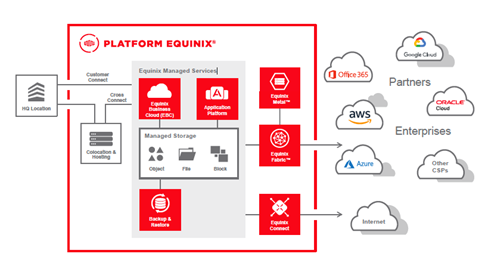
Equinix Managed Services can provide support in choosing the right Managed Storage options.
Some benefits offered by the service include:
-
Flexibility to purchase storage
-
No investments in storage hardware and maintenance contracts
-
Monthly scaling of storage resources
-
High availability of 99.99 %
-
Various ISO certifications
-
Experienced and certified staff
-
Compliance with GDPR and European regulations (for auditability)
-
Guaranteed performance according to agreed KPIs
Variants
The method of storing data is determined by the data characteristics. Unstructured data requires a different storage type from a database or a file.
Speed, guarantee, approach, and protection are characteristics that define a storage type. For this reason, Equinix offers the following types of storage:
Object storage is a method that is particularly suitable for storing large quantities of unstructured data.
Availability of the data is determined by an applied policy. Through a policy, you determine how many copies of the data are stored, and in which locations. You can configure the data yourself through the self-service portal. Both the portal as well as the data can be accessed via an API.
Use cases for Object storage are:
-
Storage of unstructured data for applications
-
Data for data analytics
-
Offloading based on Netapp Fabric pool
-
Storage of Archive or Back-up data
Policies
By means of policies, a certain availability can be selected in the self-service portal. Managed Object storage is available in the following policies:
-
Standard – This is the default setting for Object storage performance. With this policy, the data is stored twice within the data center.
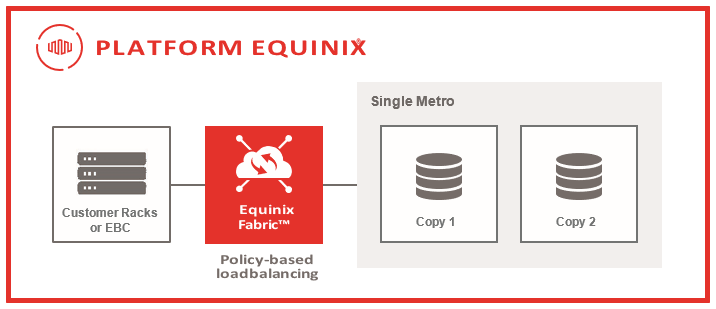
-
Site protected – With Site Protected, data is stored twice at two geographically separate EQDP sites. The data is protected against failure at one site. Data traffic is automatically routed to the second data center without any loss of service or data.
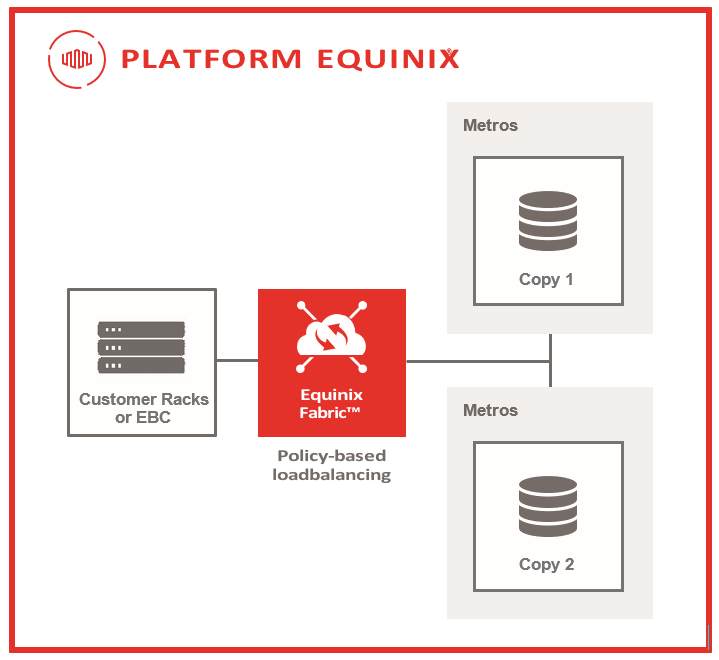
-
Dev-Test – This offers single storage of the data in the chosen data center. It is suitable for reproducible data such as dev/test data.
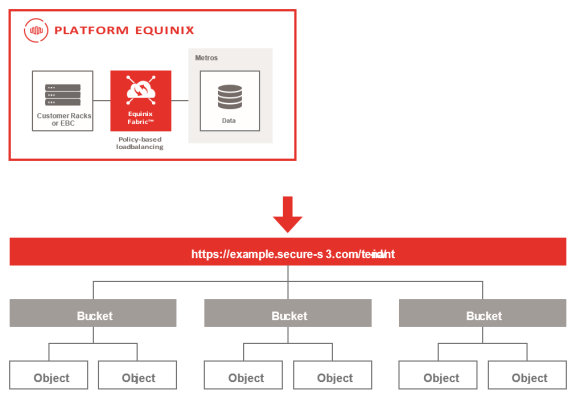
Note: In case of a disruption, the data may not be reproducible.
Functionalities
Inmutability/Worm
A frequently requested feature for archiving and/or compliance purposes is that data cannot be modified after it has been stored. Object storage can be configured to have WORM (Write Once Read Many) properties. This function is available via Self-Service.
Versioning
This makes it possible to apply Information Life Cycle Management. Versioning is placed at bucket level and is available via Self Service.
Access
Object storage can be accessed via the Internet. The available bandwidth is 1 Gbps, and a fair use policy applies to this. If required, higher bandwidths are available for quantities over 50 TB.
In addition to security through username and password, and/or token-based authentication, you can choose to increase your data security by putting your IP addresses on the allow list. This will allow only the specified IP addresses to access the Object Storage API and the self-service portal.
If you want a direct connection to the object storage, you can contact your account management.
Object Storage API
Object Storage supports the Simple Storage Service (S3) API, implemented as a set of Representational State Transfer (REST) web services. The API enables you to connect service-oriented applications developed for S3 web services to local object storage that uses the Object. This requires minimal changes to the current use of S3 REST API calls by a client application. The S3 API is fully compatible with the AWS S3 API.
Self-service Portal
You can manage your environment through the self-service portal. Use the portal to manage:
-
Accounts
-
Buckets
-
Policies
-
Identity access federation
-
Access Keys
-
System status
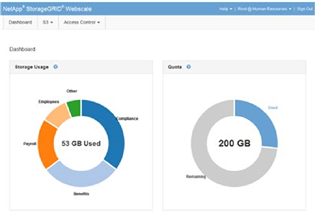
How Does It Work?
Together with the user, an intake is done, in which the bandwidth and IP addresses are tuned. Then the connection, portal and storage are configured.
Once this is achieved, the user receives information about the login details for the portal, and the tuned variables. Using these details, the user can configure the object storage by creating his own buckets, and linking them to the different profiles.
Purchase Units
With Object storage, you contract the amount in GB, rounded off in units of 250 GB. Here, you have to take into account which policies will be applied from those available.
To give you more flexibility, the volume is created with the size of the contracted quantity + 50%. You can expand this space during the contract period in blocks of 250 GB.
Shrinkage is possible after the first year with a maximum of 25% of the contracted quantity, with a maximum of 1000 GB per year.
Object storage is stored once or twice according to the policies. Data that is stored twice is counted twice for billing purposes. In cases with multiple sites, the connection costs between the data centers are part of the storage price.
Object storage performance is charged as follows:
-
Object Storage Performance in GB
-
Overage Object Storage Performance in GB
The contracted quantity is charged per month in advance. Consumption in excess of the contracted quantity is invoiced monthly in arrears as Overage Object Storage in GB.
Relations and Dependencies
Object Storage offers a self-service functionality for its related services and dependencies via its portal and APIs.
Files, folders, and directories are stored based on File storage. File storage is offered based on an SMB or NFS file share. In contrast to Block storage, the file system of File storage is provided by Equinix. This is offered in two variants:
-
Standard – The data is stored on one location.
-
RPO=0 – The data is synchronously replicated to another data-center.
File Storage has several tiers with the following properties.
| Tier | Name | Application | Performance |
|---|---|---|---|
| 1 | High performance |
|
|
| 2 | Performance (Default) |
|
|
| 3 | Standard |
|
|
-
IOPS – Maximum value at 65% read / 35% write with 8 KB block.
-
Limit – Determined on the basis of fair use. At long lasting exceeding the fair use, Equinix reserves the right to set the warranty as the limit.
-
Latency – From the same data center, average per 5 minutes within IOPS-guarantee.
-
Size – Increases per 250 GB.
-
GBs will be implemented in multiples of 1024.
-
1 TB = 1000 GB.
How Does It Work?
Together with the user, an intake is carried out, in which bandwidth, back-up, and protocol (SMB or NFS) are coordinated.
Managed Storage File can be accessed through a private dedicated connection. This way, a safe and fast connection is realized. This connection is made from your rack or EBC environment to the Managed Storage platform. Once this is realized, the user receives a delivery document with the tuned variables, and can configure the connection to the file share.
Purchase Units
With File Storage, you can contract the amount of storage per tier in GB, rounded in units of 250 GB.
For more flexibility, the volume is created with the size of the contracted quantity + 50%. This amount of storage is reserved and presented in the form of a volume. You can expand the size during the contract period in blocks of 250 GB.
Shrinkage is possible after the first year with a maximum of 25% of the contracted volume with a maximum of 1000 GB per year.
Managed Storage File is charged as follows:
-
File Storage <Tier name> in GB
-
Overage File Storage <Tier name> in GB
The contracted quantity is charged per month in advance. Consumption in excess of the contracted quantity is invoiced monthly in arrears as Overage File Storage in GB.
Note: For contracted quantities above 10 TB, consultation with the user will take place.
File Storage RPO=0
File storage offers continuous data replication from one site to another. This option is suitable for implementing scenarios where an RPO value of 0 (zero) is required. Every write to the data is immediately performed on both sites. Only when the data is written correctly on both sites, a commit takes place. In the event that the storage on site A is unavailable, the storage on site B is accessed.
File Storage Premium is only available for the High Performance and Performance Tiers. In combination with EBC ST Premium, an infrastructure can be delivered with RPO=0 and an RTO of 30 minutes.
See the service description of EBC Single Tenant Premium for details.
Implementation of File storage premium is the Active Passive variant, where the primary location is always site AM3 and the secondary location ZW1.
In the event of a disaster, writing and reading can take place in ZW1. Standard file storage can, however, be purchased on AM3 or ZW1. In addition to replication, the storage characteristics are the same as File Storage.
To access the data in ZW1 in the event of a disaster, an additional connection between the two data centers is required. A Dual Diverse Metro Connect or a Stretched Layer-2 Shared can be purchased for this. It is the user's choice whether the source infrastructure is also redundantly distributed across multiple data centers.
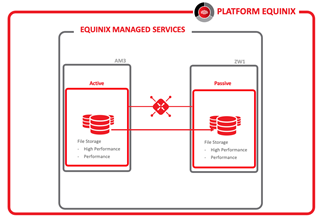
Purchase Units
With File Storage Premium, you contract the amount of storage per tier of replicated data in GB, rounded in units of 250 GB. The rate per GB includes twice the amount of stored data, including the replication infrastructure. There are no additional costs for the connectivity and network infrastructure.
For more flexibility, the volume is created with the size of the contracted quantity + 50% . This amount of storage is reserved and presented in the form of a volume. You can expand during the contract period in blocks of 250 GB.
Shrinkage is possible after the first year with a maximum of 25% of the contracted volume with a maximum of 1000 GB per year.
Managed Storage File RPO=0 is charged as follows:
-
File Storage RPO=0 <Tier name> in GB
-
Overage File Storage RPO=0 <Tier name> in GB
The contracted quantity is charged per month in advance. Consumption more than the contracted quantity is invoiced monthly in arrears as Overage File Storage in GB.
Note: For contracted quantities above 10 TB, consultation with the user will take place.
Relations and Dependencies
-
File storage can be provided only with a direct connection. In case a user is not yet present in the data center where the storage is located, additional connectivity is required. The connectivity is not part of the Managed Storage service, but must be purchased separately.
-
Backup of data can be purchased via Backup & Restore.
Block storage offers a block-device to users by means of iSCSI in the form of a LUN. The user is then free to configure its own file system.
Block storage is suitable for applications where an own file system is required, such as databases. It is available in several performance variants.
The properties of this storage service are shown in the following table below.
| Tier | Name | Application | Performance |
|---|---|---|---|
| 1 | High performance |
|
|
| 2 | Performance (Default) |
|
|
-
IOPS – Maximum value at 65% read / 35% write with 8 KB block.
-
Limit – Determined on the basis of fair use. At long lasting exceeding the fair use, Equinix reserves the right to set the warranty as the limit.
-
Latency – From the same data center, average per 5 minutes within IOPS-guarantee.
-
Size – Increases per 250 GB.
-
GBs will be implemented in multiples of 1024.
-
1 TB = 1000 GB.
Purchase Units
Managed Block Storage has one unit of purchase, namely:
-
Block Storage <Tier name> in GB
The contracted amount is charged per month in advance.
Relations and Dependencies
Block storage can be provided only with a direct connection. If a user isn't present in the data center where the storage is located, additional connectivity is needed, that must be purchased separately, not being part of the Managed Storage service.


